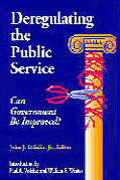Once again the Bush administration is embroiled in controversy over the future of the federal civil service. Last year it was the fight over union bargaining rights at the new Department of Homeland Security. This time it’s the Defense Department’s plan to create an entirely new personnel system for its 750,000 civilian employees.
Most of the plan has been tried before here and there across government: pay for performance, a faster hiring process, more managerial authority and streamlined job descriptions. But because the proposal covers more than a third of the federal workforce, contains unreviewable authorities for the secretary that have never been tried and comes on the heels of the Homeland Security breakout, it would effectively mark the end of the civil service system as we know it.
Contrary to recent testimony on Capitol Hill, however, the department is not seeking the kind of blank check embedded in last year’s Department of Homeland Security proposal. That proposal contained only two sentences granting the president take-it-or-leave-it authority to design a new system from scratch. The Defense Department’s opening bid is more than 200 pages long and reflects two years of planning based on a decade of detailed research.
Nevertheless, Democrats and federal employee unions are right to wonder which Bush administration is involved in the latest proposal. Is it the administration of Colin Powell and Tom Ridge, who rarely miss an opportunity to commend their civil servants for a job well done, or is it a White House that spent last fall bashing the employee unions? Is it represented by the president’s personnel office, which had made every effort to include civil servants in the reform conversation, or by the president’s budget office, which just cannot let go of its poorly planned proposal to put 450,000 federal jobs up for competition?
The answer is in the proposal itself. First, the proposal was designed by David S.C. Chu, the defense undersecretary for personnel and readiness. He is a deeply committed public servant who has spent years studying the civil and military personnel system for the Rand Corp. Disagree with him on the substance of the plan, but not on his motivation. Second, the proposal would be a huge improvement over the current system, which fails at virtually every task it undertakes. According to recent surveys by my Center for Public Service at the Brookings Institution, Defense employees know how bad things are. They describe the hiring process as slow and confusing, the disciplinary process as virtually useless and the chance to advance as limited at best.
Two in five say there are too many layers between themselves and top management, and on average they estimate that roughly one in five of their co-workers is not doing his or her job well. Asked to explain the poor performance, two-fifths say the department does not ask enough of its employees, and another quarter complain that the poor performers are simply not qualified for their jobs.
The complaints are loudest at the bottom of the Defense hierarchy, where the union members work. Front-line employees are the ones who have to lift the extra weight as the hiring process drags on for months, or fill out the paperwork created by managers with little to do. The civil service system is not to blame for all the problems at Defense, however. Two in five Defense employees report that only sometimes or rarely do they have enough access to the training they need, while almost half say the same about having enough co-workers to do the job. Those frustrations come from the budget, not the civil service system.
Moreover, front-line employees have reason to wonder whether their managers have the experience to use the freedoms embedded in the Defense proposal. After all, it is managers, not front-line employees, who have created the hyperinflated performance appraisal system that has turned the Pentagon into Lake Wobegon East a place where all the employees are above average. Even acknowledging that the elongated grievance process makes an honest appraisal an act of heroism, too many Defense managers would not know how to give a clear review if they had the freedom to do so.
That is why Congress should expand upon the House Government Reform Committee’s effort to make sure that the employees have at least some independent avenue of appeal for adverse personnel decisions. Under the proposal, it is the department’s way or the highway. Congress should also establish a clear set of rules to govern employee rights in this break-out and all the ones that will surely follow.
No amount of reform will work, however, if agencies do not have the dollars for better training and more staffing. If Congress and the president move ahead with reform, they need to provide the dollars to make it work. Why bother otherwise?







Commentary
Op-edThe End Of the Civil Service?
May 9, 2003